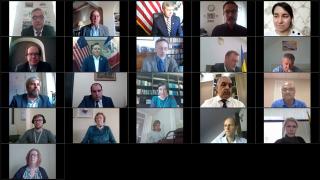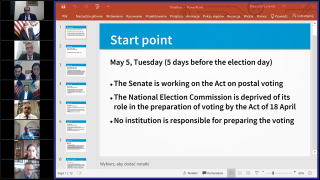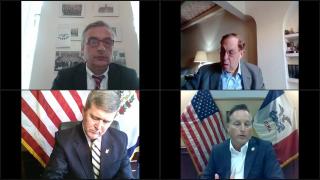 ACEEEO held an online symposium on elections for the second time 6 June 2020. The focus, again, was on the effects of the COVID-19 virus on elections. The topic of 'The constitutional and legal background of postponing elections' was discussed by the active participation of more than 50 practitioners and scholars from all over the world. The virtual meeting focused on five case studies (Croatia, Poland, Serbia, Ukraine, and the U.S.) and discussed the legal and practical approach to holding or postponing elections under the threat of COVID-19 pandemic.
ACEEEO held an online symposium on elections for the second time 6 June 2020. The focus, again, was on the effects of the COVID-19 virus on elections. The topic of 'The constitutional and legal background of postponing elections' was discussed by the active participation of more than 50 practitioners and scholars from all over the world. The virtual meeting focused on five case studies (Croatia, Poland, Serbia, Ukraine, and the U.S.) and discussed the legal and practical approach to holding or postponing elections under the threat of COVID-19 pandemic.
The Symposium was opened by Zsolt Szolnoki (Secretary General, ACEEEO), who emphasized that the first meeting was successful; a unique debate had been initiated. The first speaker, Krzysztof Lorentz (Head of the Department, National Electoral Office of Poland) gave an update on the Polish situation that was in the focus of the first Symposium as well. Mr. Lorentz described the exact timeline starting from 5 May, outlining the procedure involving many actors that eventually led to a political agreement that elections were going to be held 10 May with closed polling stations.  This led to an ambiguous situation as elections without the possibility of voting is not regulated by the background legislation, so the National Election Commission (NEC) had to apply some analogous regulation to overcome the situation. According to the agreement the NEC regained its previous role, and amendments were introduced to adapt to the new situation. As of 4 June, new elections were set for 28 June. Mr. Lorentz emphasized that beside the financial costs, the highest costs of the situation was of social and electoral nature.
This led to an ambiguous situation as elections without the possibility of voting is not regulated by the background legislation, so the National Election Commission (NEC) had to apply some analogous regulation to overcome the situation. According to the agreement the NEC regained its previous role, and amendments were introduced to adapt to the new situation. As of 4 June, new elections were set for 28 June. Mr. Lorentz emphasized that beside the financial costs, the highest costs of the situation was of social and electoral nature.
The second speaker, Damir Kontrec (Vice-president, State Electoral Commission of the Republic of Croatia) gave insights to the Croatian experience. In Croatia two early local elections were postponed after an accelerated amendment procedure to the electoral legislation had taken place. The elections are supposed to be held within 90 days after the virus is over. Mr. Kontrec also highlighted many factors that needs to be considered if elections are postponed (e.g. clear legal basis, deadline for holding the elections) or if held (e.g. public health campaign, equipment) during epidemic.
The third intervention focused on Serbia. The speaker, Branko Marinkovic (Deputy Secretary, The Republic Electoral Commission of Serbia) summarized the key experiences starting from 4 March. Elections were supposed to held on 26 April, however, as the virus appeared in March, state of emergency were declared, and the elections were postponed – a decision made via decree but later confirmed by the National Assembly. In 10 May the President of the Republic set a new date for the elections, 21 June. Afterwards, the Electoral Commission adopted measures as to the conduct of the upcoming elections. Mr. Marinkovic underlined, that the constitution does not provide a clear background for postponing elections, but the declaration of state of emergency was sufficient basis. The decision was brought before the Serbian Constitutional Court that declared the postponement in accordance with the constitution. Mr. Marinovich also emphasized that the decision on the postponement was made with the participation of all the relevant stakeholders (political parties).
The fourth speaker, Vitalii Plukar (Deputy Chairman, Central Election Commission of Ukraine) presented on the situation in Ukraine. Mr. Pulkar emphasized that the spread of COVID 19 inevitably affected elections, in Ukraine as well, where election was held 15 March in a single-mandate constituency. The CEC adopted measures to be followed by lower level EMBs in order to keep public health and to adopt to the situation. The speaker noted that the election resulted low turnout. The next local elections are going to be held 25 October 2020, and this event needs to be adjusted to the possibility of a second wave. This requires amendments to the electoral legislation. Mr. Pulkar noted that the postponement had not been considered so far, and under the constitution the right to vote could be restricted only by martial law or state of emergency. Consequently, the postponement is not likely, rather, a special strategy will be developed to accommodate to the situation.
 The fifth country to focus on was the United States. The next speaker, Paul Pate (President, National Association of Secretaries of State), informed the publicum that thorough preparations were taking place in the U.S. that involve the cooperation of members of the nationally decentralized electoral administration. A new campaign called ‘Trusted Info 2020’ is launched that urges voters to acquire information directly from the authorities. Mr. Pate emphasized that the decentralized form provides flexibility, and various measures can be implemented this way. Many primaries had been postponed, and possibilities of absentee voting had been made more accessible. Local elections have been most suitable to be ‘pilot’ projects, to test new solutions. Comprehensive campaigns were launched not just to inform voters but poll workers and election officials as well. Mac Warner (Secretary of State, West Virginia) joined the conversation to share his experiences. He emphasized the importance of dialogue, especially within the multi-layered electoral administration and of the necessity of following the rule of law. He also noted that training is paramount, as well as sharing information. To this end, a plan for operation was prepared. Mr. Warner noted that foreign best practices were of great help, especially from Estonia. He also noted that electronic voting may help to reach out to distant voters and to those prevented to show up personally, therefore, technological innovations need to be followed. Richard Soudriette (Honorary Member, ACEEEO, former president, IFES) emphasized the importance that all candidates pledge to recognize the results of the elections, a condition that is unusual and would be unnecessary in normal circumstances. EMBs under great pressure, but so far they did a great job, according to Mr. Soudriette. His biggest concern is that after the elections in November the whole process will be called into question. The main task therefore is to mitigate concerns regarding the validity of elections.
The fifth country to focus on was the United States. The next speaker, Paul Pate (President, National Association of Secretaries of State), informed the publicum that thorough preparations were taking place in the U.S. that involve the cooperation of members of the nationally decentralized electoral administration. A new campaign called ‘Trusted Info 2020’ is launched that urges voters to acquire information directly from the authorities. Mr. Pate emphasized that the decentralized form provides flexibility, and various measures can be implemented this way. Many primaries had been postponed, and possibilities of absentee voting had been made more accessible. Local elections have been most suitable to be ‘pilot’ projects, to test new solutions. Comprehensive campaigns were launched not just to inform voters but poll workers and election officials as well. Mac Warner (Secretary of State, West Virginia) joined the conversation to share his experiences. He emphasized the importance of dialogue, especially within the multi-layered electoral administration and of the necessity of following the rule of law. He also noted that training is paramount, as well as sharing information. To this end, a plan for operation was prepared. Mr. Warner noted that foreign best practices were of great help, especially from Estonia. He also noted that electronic voting may help to reach out to distant voters and to those prevented to show up personally, therefore, technological innovations need to be followed. Richard Soudriette (Honorary Member, ACEEEO, former president, IFES) emphasized the importance that all candidates pledge to recognize the results of the elections, a condition that is unusual and would be unnecessary in normal circumstances. EMBs under great pressure, but so far they did a great job, according to Mr. Soudriette. His biggest concern is that after the elections in November the whole process will be called into question. The main task therefore is to mitigate concerns regarding the validity of elections.
The Symposium was concluded by János Mécs (Project Manager, ACEEEO). Mr. Mécs gave an overview of the first and the second symposium, emphasizing that while there is no single good answer to the question of holding or postponing, certain good and bad practices are at hand. South Korea held elections successfully, however, this example cannot be applied automatically, while in Poland the process led to a failure that may have great financial but more importantly societal costs. Examples from Croatia, Serbia and Ukraine show that the different constitutional frameworks provide different room for maneuver. Experiences from the U.S. underlined the importance of dialogue and learning, and the relevance of preparing for the pandemic in time.
Read the updated ACEEEO recommendations on 'Elections in the ACEEEO region in times of Covid-19'.
Save the dates: the next Online Symposium will be held on 2 July at 2 PM (CET).

